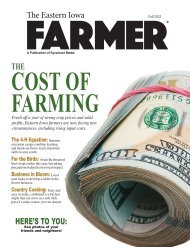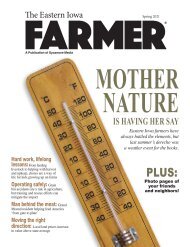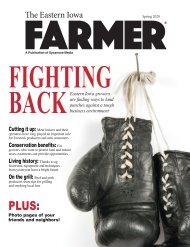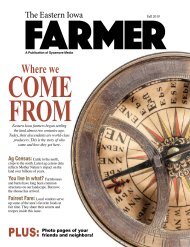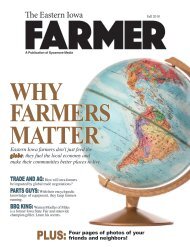Eastern Iowa Farmer Fall 2020
You also want an ePaper? Increase the reach of your titles
YUMPU automatically turns print PDFs into web optimized ePapers that Google loves.
Reader<br />
and ranchers who produce it. That’s what is<br />
behind the popularity of The <strong>Eastern</strong> <strong>Iowa</strong><br />
<strong>Farmer</strong>. Even in <strong>Iowa</strong> where agriculture<br />
is a very big deal, the majority of readers<br />
don’t climb into a tractor cab to start<br />
their day. Nevertheless, agriculture makes<br />
for important and entertaining consumer<br />
information.<br />
Readers may punch a time clock or<br />
pound a computer but there is something<br />
compelling about the land no matter how<br />
distant the connection. The Rural Reader<br />
column should help satisfy that curiosity<br />
with news of titles and writers that focus<br />
on farming and everything associated<br />
with it.<br />
The literature of agriculture, both technical<br />
and entertaining, continues to crowd<br />
a sagging shelf devoted to farming, rural<br />
living and the Midwest.<br />
The Rural Reader will highlight some<br />
of that literature, old and new, to help you<br />
learn more about the importance of farming<br />
and the food you eat.<br />
Good weeds?<br />
You may snort in disgust at what comes<br />
next but I’m going to say a few good<br />
things about weeds. At our farm<br />
west of Andrew, life in<br />
the summer is all<br />
about at least<br />
controlling if<br />
not eradicating<br />
weeds. In the renter’s corn and soybean<br />
fields big self-propelled outfits from the<br />
local farm cooperative make short work of<br />
crop weeds with 120-foot spray booms. I<br />
mow, trim and chop around the farmstead,<br />
and Brenda hoes with precision around<br />
delicate plants in her gardens. And still<br />
weeds persist. Is there a higher power at<br />
work here?<br />
Richard Mabey is perhaps England’s<br />
foremost nature writer. Mabey’s definition<br />
of a weed in his 2010 book Weeds: In<br />
Defense of Nature’s Most Unloved Plants<br />
(Harper Collins, 324 pages, $26) is subtly<br />
admonishing in a sly way. Mabey says<br />
plants become weeds when they obstruct<br />
our plans, our tidy maps of the world. He’s<br />
right. In fact, the naturalist believes weeds<br />
are sometimes exactly the right plant in<br />
the right spot at the right time. They cover<br />
exposed raw soil, they indicate soil fertility<br />
or sterility, even the soil type and moisture<br />
holding capacity.<br />
The impression that weeds are more<br />
successful than farm crops or garden plants<br />
is correct. Survivors, hardy and adaptable,<br />
weeds are the first to the scene of soil<br />
disturbances of any kind. Annuals, then<br />
biennials and finally the perennials, they all<br />
rush to fill the void. Thus, the fireweed that<br />
invades burned out forest land or Canada<br />
thistle on drought stricken dryland fields. It








